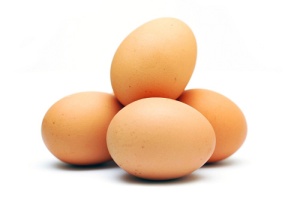Article Review: To yolk, or not to yolk?
I’ve decided to start something new on my little blog here. I’m going to start an article review section and summarize some scholarly articles or scientific journal articles I read. I have always been interested in keeping up with my nutrition knowledge long into my career. I officially passed my boards and became a registered dietitian (RD) a week ago (yay)! I know that keeping up with the newest findings and having scientific knowledge and data to back up recommendations is one of the most important aspects of this field! So, this is my first article review for my blog. It won’t be anything fancy, but it will help me: a.) Stay up to date with current nutrition findings and studies
b.) Keep my writing skills up to par, and…
c.) Summarize articles that may seem daunting and complicated at first in order to make them easy to understand for all my readers!
I will include some personal background, opinions, and information into my reviews. I hope you all enjoy this new section!
The first article I have chosen is entitled “Dietary Cholesterol and egg yolks: Not for patients at risk of vascular disease ” by Spender, Jenkins, and Davignon. Here is my citation before I forget!
"Spence, J. D., Jenkins, D. J., & Davignon, J. (2010). Dietary cholesterol and egg yolks: not for patients at risk of vascular disease. Canadian Journal of Cardiology, 26(9), e336-e339."
To yolk, or not to yolk? That is a question I get almost every time I speak to someone about nutrition and food choices. It is a topic that is always up for debate. It seems that for every article I find that supports the consumption of egg yolks, I find one that discourages the consumption of egg yolks. What is one to do? Nutrition is such a complicated field because there are always studies contradicting each other. Every body is different and reacts to food choices differently. Therefore, you have to find what works for you! I’ll try to summarize this article as clearly as possible, while hoping to equip you all with the knowledge you need to make the choices and changes that work well for you!
High cholesterol levels have long been thought to be associated with actual dietary cholesterol intake from our food. However, there have been studies in the past few years supporting the belief that actual cholesterol in the diet does not contribute to blood cholesterol levels, and therefore does not add any risk of cardiovascular disease.
The authors of the article for this review focused on whether or not egg yolks are suitable food choices for people already at risk of vascular disease. Vascular disease is a form of cardiovascular (heart and blood vessels) disease that affects the actual blood vessels in the arteries. The authors claim that the previous studies done proving that the dietary cholesterol found in egg yolks, red meat, and cheese does not harm individuals was done on subjects that were already healthy, young, and on a weight loss and diet plan. The story seems to be a little different for those who are already at risk of cardiovascular disease, are sedentary, and are not losing weight, which unfortunately includes the majority of the population.
The guidelines originally promoted by the National Cholesterol Education Program recommended a low fat diet, which has now been proven to not be very effective in overall weight loss or the improvement of blood cholesterol levels. While nutrition experts are now recommending healthier, low cholesterol fats to be part of the everyday diet (nuts, olive oil, avocado, etc), the authors believe that those at risk of cardiovascular disease should still avoid foods high in cholesterol. “At risk” can be defined as those who already have high cholesterol levels or have familial hypercholesterolemia (those genetically predisposed to having high cholesterol levels).
The authors refer to studies showing that as much as 12% of dietary cholesterol is in the oxidized form. Oxidized cholesterol, and especially LDL oxidation, puts people at risk for plaque formation in the arteries, leading to the thickening of arteries, which can be very dangerous for cardiovascular health. Another interesting point the authors make is that, in the previous studies proving that the cholesterol in egg yolks was harmless to healthy individuals, those who consumed egg yolks regularly actually became diabetic during the study. And this was only from the consumption of one egg yolk per day! This blew me away. You may wonder what cholesterol has to do with diabetes, but it actually has a lot to do with diabetes! High cholesterol, high triglycerides, high blood glucose, an increased weight circumference, and high blood pressure all are components of what is called “metabolic syndrome.” Having three of any of the above symptoms puts people at an increased risk of cardiovascular disease, diabetes, and obesity. At the end of the article, the authors conclude that egg yolk consumption should not be encouraged for those who are inactive and are already at an increased risk of cardiovascular disease.
Personal reflections:
My history with egg consumption has been an "up and down” kind of experience. I was very much against the consumption of egg yolks a few years ago and only ate egg whites. I saw egg yolks as little cholesterol bombs that would basically cause me to have a heart attack. After reading more about how dietary cholesterol levels are actually more related to refined carbohydrate intake rather than cholesterol intake, I started incorporating more egg yolks into my diet. My blood cholesterol levels went from 183 mg/dL of total cholesterol (as a vegetarian) to 115mg/dL (as a definite meat and egg eater). I was amazed! However, I realized that at the time I raised my egg yolk consumption, I also dramatically decreased my refined carbohydrate and grain intake. I was only receiving carbohydrates from fruits and vegetables, and had cut out all grains and legumes (which are basically a carbohydrate considering their high starch content). I think this is an important factor to consider. Most people cannot simply just add egg yolks to their already poor, refined carbohydrate-rich diet and expect to see their cholesterol levels drop. Considering my experience with egg yolks, I started to eat them regularly, almost 2-3 whole eggs a day. I usually mixed in some liquid egg whites to my omelets as well for added fluffiness and protein. So you can imagine my surprise when I read this article last week! I was left so confused about what to do with these pesky little yolks and how to make recommendations to my clients.
I realized that, while the articles promoting egg yolks focused on healthy individuals, this article focused on those who are already sick or at risk of cardiovascular disease. I think this is a very crucial point to address. The target population that these scientific research studies are focusing on is the key to knowing how to apply their various, and often contradictory findings. Keeping all of this in mind, I concluded the following:
In my experience, I have found that eating egg yolks has provided me with more energy, better hair and skin, has kept me feeling full for longer than a typical high carbohydrate breakfast, and has actually lowered my cholesterol levels. However, I also have a family history of cholesterol (even though I have been blessed with low numbers thus far, and very high HDL levels!) and do not want to put myself at any more risk for heart disease or cholesterol problems later on in life. I have decided to take a "middle of the road" approach to egg yolk consumption. No, I will not cut out egg yolks from my diet. But I probably won’t be consuming 2-3 whole eggs a day. I will aim to consume one whole egg, with a max of two a day, with an increased amount of egg whites whisked in. I will also be watching my carbohydrate intake, as I have reintroduced some grains into my diet, and know full well that these can contribute to high cholesterol levels as well. I think it is very important to experiment and find out what works for YOU. I recommend starting out with a blood test with your doctor to determine what your cholesterol levels are and if you are at risk for cardiovascular disease. Above all, I believe that a HIGH fruit and vegetable intake can clear up so much of our food confusion!! Filling our plates with fruits and vegetables regularly leaves us full and limits other unhealthy choices from filling up our plates, such as refined carbohydrates, junk foods, and, for some, high cholesterol meats and eggs! Half of our plates, or even more in my opinion, should be filled with these colorful fruits and vegetables!
Overall, the takeaway from this article is that those at risk for cardiovascular diseases should watch their egg yolk consumption, since it has been linked to various cardiovascular issues, as well as diabetes. If you are a healthy, active individual who is at a normal weight, I don’t see why egg yolks should be eliminated from your diet. I recommend consulting with your doctor, getting your blood cholesterol levels checked, and always staying in tune with your body and aware of your food intake. AND EAT THE RAINBOW! :)
That is all for now and I hope you all enjoyed this article review!

